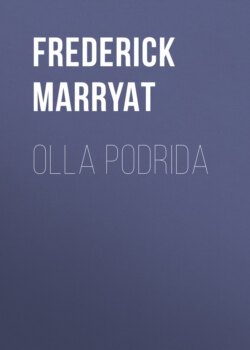Читать книгу Olla Podrida - Фредерик Марриет - Страница 4
Chapter Two.
ОглавлениеWell, as I said in my last chapter, I planned—and planned—but I might as well conjugate it, as many others assisted—it was I planned, thou plannedst, he planned, we planned, ye planned, and they planned—and what annoyed me was, that I could not help considering that “the whole house was in a committee,” and without being able “to report progress.” At first it was decided upon that we should proceed up the Rhine, and not leave off paddling until we had arrived at Manheim, at which town I fancied that I should at least be out of political distance. We read all about Manheim, found out that it was a regular-built town, with a certain number of inhabitants—with promenades, gardens, and a fine view of the Rhine. “So you’re going abroad—where?” Manheim, was the reply, and all the world knew that we were bound to Manheim; and every one had something to say, or something that they had heard said, about Manheim. “Very nice place—Duchess Dowager Stephanie—very cheap—gay in winter—masters excellent”—were the variety of changes rung, and all was settled; but at last one unlucky observation raised a doubt—another increased—a third confirmed it. “A very dull place—German cookery bad for children—steam-boats from Rotterdam very bad, and often obliged to pass two nights on deck.” A very influential member of the committee took alarm about the children being two nights on deck, and it was at last decided that to go up to Manheim by steam-boat at 4 pounds, 9 shillings a-head, and children at half-price was not to be thought of.
“I wonder you don’t go to Bruges,” observed a committee man; “nice quiet place—excellent masters—every thing so cheap—I once bought eighty large peaches there for two francs.”
And all the children clapped their little hands, and cried out for Bruges and cheap peaches.
It was further submitted that it was convenient—you might go the whole of the way by water—and Bruges was immediately under consideration.
“If you go to Bruges, you will find it very dull,” observed another; “but you’ll meet Mrs. Trollope there—now Brussels is very little farther, and is a delightful place;” and Brussels was also referred to the committee.
“You won’t like Brussels—there is such a mixture, and house-rent is dear. Now I should recommend Spa for the summer—it is a most beautiful spot—and excellent company.” And Spa was added to the list.
Then after a day or two came an Anti-Teutonic, who railed against Germany—and Germans—German towns, German travelling, and German French, which was detestable—German cookery, which was nothing but grease. “You may imagine,” said he, “and so have many more, that Germany is more pleasant and less expensive than France; but they have been disappointed, and so will you be. Now, for a quiet place, I should recommend Saint Omer—only thirty miles from Calais—so convenient—and very pretty.”
Saint Omer—humph—very quiet and retired—and no politics—and Saint Omer was occasionally canvassed.
“Saint Omer!” said another who called the next day, “you’ll die of ennui. Go to Boulogne—it is delightful—you may be there as retired or as gay as you please.”
Boulogne to be taken into consideration many inquiries made and all very satisfactory—good sands and excellent jackasses for the children.
“My dear friend, Boulogne is something like the King’s Bench—at least most of the people only go there in preference. Every body will suppose that you’ve levanted. Pray don’t go to Boulogne.”
“Why don’t you go by Southampton to Havre—there you’ll have quiet and amusement—beautiful country about Honfleur—scenery up the Seine splendid; and then you can go up to Rouen by water, if you intend to go on to Paris.”
Havre and Honfleur submitted to the committee.
But then came Dieppe, and Brest, and the environs of Paris, Versailles, Saint Germain, Passy, and other recommendations, in which every one particular place was proved incontestably to be more particularly suited to us than any other, and the committee sat for three weeks, at the end of which, upon examining the matured opinions of the last seven days, I found them to have fluctuated as follows:—
Monday morning, Manheim. Evening, Spa.
Tuesday morning, Bruges. Evening Brussels.
Wednesday morning, Saint Omer. Evening, Boulogne.
Thursday morning, Havre. Evening Honfleur.
Friday morning, Dieppe. Evening, Passy.
Saturday morning, Versailles. Evening, Saint Germain.
Sunday morning, Spa. Evening, Brussels.
The fact was, that there was a trifling difference of opinion in the committee—the great object appeared to be, and the great difficulty at the same time, to find a place which would suit all parties, that is to say, a place where there were no politics, plenty of gaiety, and cheap peaches.
